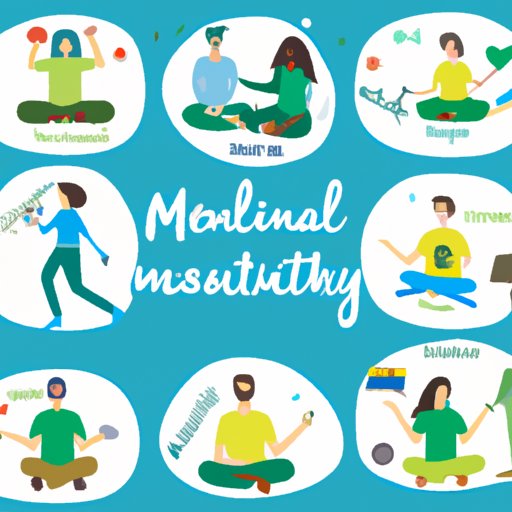Introduction
Mental health is an important aspect of overall well-being that should not be overlooked. It affects our ability to think, feel, and act in ways that enable us to lead productive and meaningful lives. Unfortunately, poor mental health can have a negative impact on our physical health, relationships, and daily functioning. Fortunately, there are steps we can take to promote and maintain good mental health.
Definition of Mental Health
Mental health includes our emotional, psychological, and social well-being. It affects how we think, feel, and act. It also helps determine how we handle stress, relate to others, and make choices. Mental health is important at every stage of life, from childhood and adolescence through adulthood.
Overview of the Problem
Poor mental health can lead to a wide range of problems. It can affect our ability to concentrate, remember things, make decisions, and manage our emotions. It can also lead to feelings of sadness, anxiety, irritability, and anger. In extreme cases, it can cause significant disruption to our daily lives and lead to substance abuse, self-harm, or even suicide.
Develop a Healthy Lifestyle
One of the best ways to maintain good mental health is to develop a healthy lifestyle. Here are some tips for doing so:
Diet
Eating a balanced diet is essential for good mental health. Eating plenty of fruits, vegetables, and whole grains, as well as reducing processed and sugary foods, can help keep your mood stable and your energy levels up. Eating breakfast each morning can also help reduce stress and anxiety.
Exercise
Regular exercise is another important part of maintaining good mental health. Exercise releases endorphins, which can help reduce stress and improve mood. Aim for at least 30 minutes of moderate exercise each day.
Sleep Habits
Getting enough restful sleep is essential for good mental health. Aim for 7-9 hours of sleep each night. Avoid screens at least one hour before bedtime and create a relaxing bedtime routine to encourage better sleep.
Practice Mindfulness Techniques
Mindfulness techniques can help reduce stress and improve mental health. Here are two popular techniques:
Meditation
Meditation is a practice of focusing your attention on the present moment. It can help reduce stress, clear your mind, and improve your mood. Start by finding a comfortable place to sit and then focus on your breathing. As thoughts come into your mind, acknowledge them and then let them go.
Yoga
Yoga combines physical poses and breathing exercises with meditation. It can help reduce stress and improve your physical and mental well-being. Try taking a yoga class, watching a yoga video online, or following a yoga routine at home.

Connect with Friends and Family Regularly
Having strong relationships with family and friends has been shown to improve mental health. Here are some tips for staying connected:
Benefits of Social Connection
Social connections can provide support, reduce stress, and increase happiness. Spending time with friends and family can also give you a sense of purpose and belonging.
Tips for Staying Connected
Make time for regular phone calls, video chats, or visits with friends and family. Join a club or hobby group to meet new people. Volunteer or take part in community activities to build relationships with others.
Take Part in Activities that Bring Joy and Purpose
Finding joy and purpose in life can help improve mental health. Here are some ideas for doing so:
Examples of Joyful Activities
Doing something enjoyable can help reduce stress and improve mood. Examples of joyful activities include listening to music, reading a book, spending time in nature, painting, cooking, or writing.
Finding Purpose
Having a sense of purpose can help improve mental health. Think about what you’re passionate about and find ways to pursue those interests. Consider setting goals for yourself and taking steps to achieve them.

Seek Professional Help if Needed
If your mental health is severely impacting your daily life, seek professional help. Here are some tips:
When to Seek Help
If you’re feeling overwhelmed, unable to cope, or having thoughts of self-harm, reach out for help. Don’t wait until the problem becomes too big to handle.
Types of Professional Assistance
Talk to your doctor or a mental health professional. They can provide counseling, prescribe medication, or refer you to other resources. There are also many organizations that offer support and guidance.
Conclusion
Maintaining good mental health is essential for living a healthy and fulfilling life. Developing a healthy lifestyle, practicing mindfulness techniques, connecting with friends and family regularly, and taking part in activities that bring joy and purpose can all help promote and maintain good mental health. If needed, don’t hesitate to reach out for professional help.
Summary of Key Points
Good mental health is essential for leading a productive and meaningful life. Developing a healthy lifestyle, practicing mindfulness techniques, connecting with friends and family, and taking part in activities that bring joy and purpose can help improve mental health. If needed, seek professional help.
Final Remarks
Taking care of your mental health is just as important as taking care of your physical health. With a few simple steps, you can promote and maintain good mental health and live a happier, healthier life.
(Note: Is this article not meeting your expectations? Do you have knowledge or insights to share? Unlock new opportunities and expand your reach by joining our authors team. Click Registration to join us and share your expertise with our readers.)
